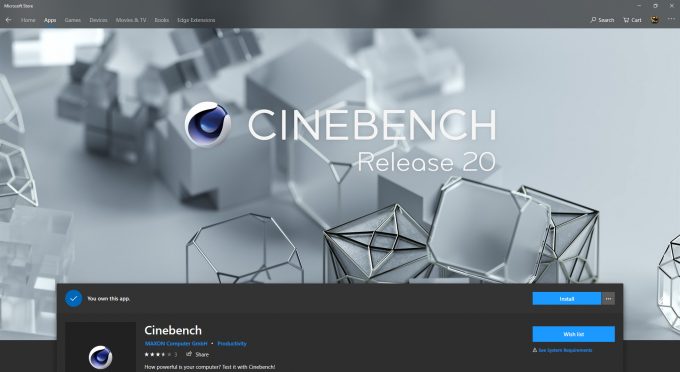- Qualcomm Launches Snapdragon 4 Gen 2 Mobile Platform
- AMD Launches Ryzen PRO 7000 Series Mobile & Desktop Platform
- Intel Launches Sleek Single-Slot Arc Pro A60 Workstation Graphics Card
- NVIDIA Announces Latest Ada Lovelace Additions: GeForce RTX 4060 Ti & RTX 4060
- Maxon Redshift With AMD Radeon GPU Rendering Support Now Available
MAXON Releases Cinebench R20, Enhances CPU Test, Drops GPU Test
For many years, MAXON’s Cinebench has been a much-loved benchmark for generating super-quick (relatively) performance results for single- and multi-thread CPU tests, as well as an OpenGL GPU test. With Cinema 4D R20 having released at last summer’s SIGGRAPH, it became clearer than ever that the standalone Cinebench benchmark needed an update. We were told after SIGGRAPH that a new version was being evaluated, and here we are: Cinebench R20 has now been released.
From the top, R20 results cannot be compared to R15, which was largely to be expected. The GPU test has also been dropped from this version, which I think was a smart move, since I’ve criticized its odd scaling in the past. Because AMD’s Radeon ProRender acts as a default renderer in Cinema 4D, it would not surprise me if an R20 point release came in the future that re-introduced the GPU test via a ProRender viewport.
On the official site for the benchmark, MAXON notes that R20 features a scene which is 8x as computationally intensive as R15. Because so many upgrades have taken place in the engine since R15, R20 will likely deliver slightly different scaling than what we’ve seen in the past, especially from processors that are not particularly beefy.
R20 also requires more memory (4x) than the old test, something we’d assume based on the extra complexity, and the fact that CB is now completely CPU-bound. MAXON notes that unsupported CPUs will not run the test (I’m not sure how this will bite benchmarkers in the butt in the future), and on rigs with lacking memory, a warning will be provided before a run is kicked-off.
It seems like an odd decision to me, but MAXON decided to toss the latest version of Cinebench on the Windows Store, which means you will need a Microsoft account in order to download it. Being a UWP app, it seemed to me that a command line option wouldn’t be available, but lo and behold, one is. Alternatively, results can be saved to the file system as long as the form is filled out before testing.
As with R15, Cinebench R20 offers an “Advanced” option in the menu which unveils the single-threaded version of the test. Given how long that test took to run on virtually any CPU in R15, we can be thankful that the “8x” more complex scene in R20 doesn’t include single-threaded testing by default!
We will integrate Cinebench R20 into our test suite in the near future, and continue to test with the real Cinema 4D for comparison’s sake. You can grab the CB R20 download for yourself here. If you want examples of initial performance with the updated benchmark, check out AnandTech.






